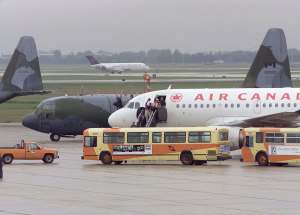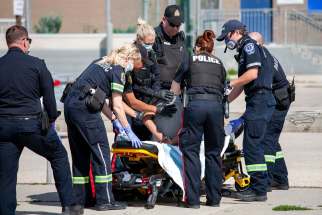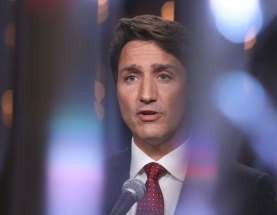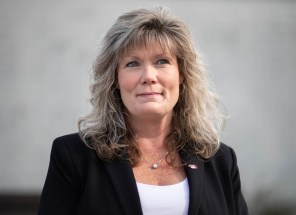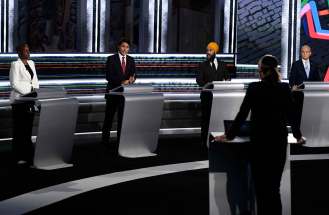Spike in protests taxes police staffing
Read this article for free:
or
Already have an account? Log in here »
To continue reading, please subscribe:
Monthly Digital Subscription
$0 for the first 4 weeks*
- Enjoy unlimited reading on winnipegfreepress.com
- Read the E-Edition, our digital replica newspaper
- Access News Break, our award-winning app
- Play interactive puzzles
*No charge for 4 weeks then price increases to the regular rate of $19.00 plus GST every four weeks. Offer available to new and qualified returning subscribers only. Cancel any time.
Monthly Digital Subscription
$4.75/week*
- Enjoy unlimited reading on winnipegfreepress.com
- Read the E-Edition, our digital replica newspaper
- Access News Break, our award-winning app
- Play interactive puzzles
*Billed as $19 plus GST every four weeks. Cancel any time.
To continue reading, please subscribe:
Add Free Press access to your Brandon Sun subscription for only an additional
$1 for the first 4 weeks*
*Your next subscription payment will increase by $1.00 and you will be charged $16.99 plus GST for four weeks. After four weeks, your payment will increase to $23.99 plus GST every four weeks.
Read unlimited articles for free today:
or
Already have an account? Log in here »
Hey there, time traveller!
This article was published 10/09/2021 (1552 days ago), so information in it may no longer be current.
The greater incidence of protests, marches and public events, including anti-mask and anti-vaccine rallies, has taken a toll on Winnipeg police staffing.
Supt. Dave Dalal, who oversees the police service’s event command group, told the Winnipeg Police Board Friday some events have the potential to become volatile as people’s emotions spill over on everything from pandemic rules to reconciliation issues.
So far this year, officers have been deployed to 110 events. Until 2017, the city averaged 12 to 15 events annually. Social media has made it much easier for rallies to be held, he said.
“Anybody with a social media account is capable of creating an event that then requires some level of police attention or response,” Dalal told the board, noting he was referring to events that took place without a parade permit being filed beforehand.
“That police response can range from… simply monitoring online to determine what risk, if any, it may present to public safety, to the full deployment of officers to the event.”
Dalal said engaging with protest organizers to assess risk and offer safety advice, to eventually deploying officers, happens almost daily.
Generally, when police assess events as medium- to high-risk, the service will deploy officers who are trained to de-escalate tense situations and manage crowds, and have experience with crowd-control equipment and safety gear.
“Using (the crowd management unit) for every event, though, is not necessary, reasonable or fiscally sound. These officers come from across all areas of the service and dedicating these members to each and every event would come at a high cost, and not just financially, but operationally, as well,” Dalal told the board.
Community support officers are often reassigned to manage events, with general patrol cops called in as a last resort.
“It puts a strain on our ability to respond to calls for service in the community and takes officers away from their critical role doing that,” Dalal said, though he repeatedly noted the goal of police is to ensure demonstrations are conducted safely, while respecting the right to protest.
Police Chief Danny Smyth said the large number of demonstrations means the service will have to reassess its response.“Using (the crowd management unit) for every event, though, is not necessary, reasonable or fiscally sound. These officers come from across all areas of the service and dedicating these members to each and every event would come at a high cost, and not just financially, but operationally, as well.” — Supt. Dave Dalal, Winnipeg Police Service
“We’ll have to take a pretty close look at how we do this… and perhaps make some adjustments,” Smyth told reporters after the meeting.
Police might train more officers in basic crowd control, Smyth said.
About 40 per cent of unpermitted demonstrations over the past two years have been pandemic-related, including anti-vaccine and anti-mask protests. An anti-vaccine mandate demonstration outside the Health Sciences Centre on Sept. 1 drew criticism after some patients said they had trouble entering the hospital.
“I’m not a big fan of anyone protesting someone who might be going to a hospital for medical care. I’ve always been supportive of people’s right to protest… places like city hall or the legislature might be more appropriate,” Smyth said.
He said more demonstrators showed up than police had anticipated and officers had to call for backup.
“We learn how to plan based on our experiences… I can assure you that we’ll be taking different plans should (a hospital protest) go forward in the future… I think our general approach would be to steer them into a different location,” the chief said.
“You can’t be blocking emergency departments at hospitals.”
erik.pindera@freepress.mb.ca

Erik Pindera reports for the city desk, with a particular focus on crime and justice.
Our newsroom depends on a growing audience of readers to power our journalism. If you are not a paid reader, please consider becoming a subscriber.
Our newsroom depends on its audience of readers to power our journalism. Thank you for your support.


